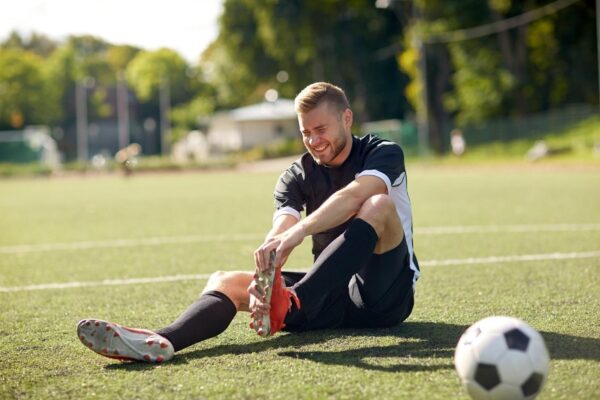When you fall during a game and hear a sudden “pop” coupled with pain, it’s easy to realize you need a sports medicine doctor, ASAP.
But what about those sneaky little injuries that only cause minor discomfort, or seem to come and go?
Sometimes, the sneaky ones can creep around and then surprise you with a major injury that kicks you to the sideline for weeks or more.
While certain types of aches and pains don’t require an appointment with a sports medicine doctor, others will fester until they erupt – leaving an athlete in a serious dilemma.
Are you questioning whether you have the sneaky kind of injury that’s plotting your demise if left untreated, or the kind you can treat at home and bid farewell to? Sometimes, it’s tough to differentiate between the two. We’ll help you determine when it’s time to visit a sports medicine doctor or a sports injury specialist.
THE THREE QUESTIONS ALL INJURED ATHLETES ARE ASKING
Consider the common questions and scenarios below before choosing to see or not see a sports medicine doctor. We’ll suggest the best response to these questions and scenarios.
“I’ve Suffered the Injury for Less than a Week, but it Bothers Me During Sport…What Should I do?”
You should stop playing and take it easy for a week. Follow the R.I.C.E. method (Rest, Ice, Compression, Elevation) for a week and see if the injury gets better.
Do not massage or aggravate the injured area in any way. Simply let it heal so that it doesn’t come back to bite you later.
If you’re hesitant about taking a week off from your sport due to lost fitness, try cross-training, stretching, and strengthening exercises that do not target or irritate the injured area.
Depending on where your injury is, certain cross-training activities will maintain your fitness level during the week off. Swimming/Water aerobics are usually helpful for athletes since it is a no-impact activity.
If you have a coach or personal trainer, ask them which type of cross-training or exercises are best for your situation. If you’re more of a weekend-warrior when it comes to sport, we highly recommend taking a complete rest from the aerobics and weight-bearing activities.
Do not stretch, strengthen, or massage the hurt area for a week, as it may aggravate the area. Instead, try to ice the area three times a day while following the R.I.C.E. Method.
If your injury does not return after resting it for a week, there’s no need to see a sports medicine doctor.
“I Followed the R.I.C.E. Method for a Week, but the Injury Returned…Now What?”
It’s time to see a sports medicine doctor. The cost of seeking treatment now is less than the cost of a worsening injury left ignored.
A sports medicine doctor can diagnose and help you heal your injury before it turns into a major problem.
“How Can I tell if It’s Just Soreness or an Actual Injury?”
Sometimes, it’s difficult to differentiate between soreness and an actual injury.
The chart below will help you discern whether it’s just soreness or an injury which will worsen if left untreated.
Soreness vs. Injury
| Soreness | Injury | |
| What it Feels Like | Achy or dull when resting or moving, but no loss in mobility. | Achy or sharp when resting or moving, sometimes with loss of mobility. |
| When it Occurs | 24-72 hours after exercising. Particularly after intense exercise or new types of exercise. | During exercise or less than 24 hours after exercise. |
| How Long it Lasts | 2-3 days if you reduce the intensity or rest | Persists or returns periodically for more than a week |
| Where it Hurts | Muscles | Muscles, joints, or bones |
| Feels Better With | Stretching and mild-intensity movement | Rest and Ice |
| Feels Worse With | Sitting or standing still | Exercise/Continuing with Your Sport |
| What to Do | Take a couple of days easy after intense exercise or new types of exercise. Always increase intensity & load gradually, so that your body has time to adapt | Try a week of rest and R.I.C.E. If the injury persists after the week off, contact a sports medicine doctor. |
It’s tempting to continue playing through a sports-injury that feels minor. However, if you have the symptoms of an injury, your injury will continue to worsen if left untreated. As your injury worsens, you risk higher medical bills, more time out-of-sport, and compromised athletic performance.
WHY SEE A SPORTS MEDICINE DOCTOR INSTEAD OF A PRIMARY CARE DOCTOR?
Photo by Online Marketing on Unsplash
While primary care doctors can sometimes treat minor sports-related injuries and order imaging tests for injuries that might affect bones or joints, they do not have the same advanced knowledge of sports-related injuries that sports medicine doctors have.
Many primary care doctors recommend ice, rest, and anti-inflammatory medications for sports-related injuries. While these types of treatments can help athletes feel better, the relief is temporary because these treatments do not heal the cause of the injury.
The icing, rest, and medications prescribed by a primary care doctor won’t help an athlete whose injury is caused by a weak muscle, for example.
Sports medicine doctors help athletes by treating the cause of the injury. Instead of pills, they prescribe treatments such as strengthening, stretching, and mobility exercises to target weak and unconditioned muscles.
Certain types of sports medicine doctors, such as sports physical therapists, are trained to make an accurate diagnosis of both the injury and underlying cause. They can then recommend a course of treatment that will help the athlete get back into sport stronger than ever, with a reduced chance of reinjury and decreased risk of other injuries.
If You Don’t Treat Your Sports Injury Now, You’ll Regret it Later
You’ve determined that the discomfort you feel is likely a sports injury. Why not wait a little longer and see how it feels before turning to a sports medicine doctor?
Bad idea.
Sports injuries gone ignored will only get worse and trying home treatments for an undiagnosed injury will probably fail.
Countless athletes have tried unsuccessful self-care programs and regretted not seeking the appropriate help.
Save yourself regret– contact a sports medicine doctor, who can give you the appropriate diagnosis and treatment. You’ll spend less time on the sidelines and less money on a serious injury that stemmed from a neglected minor injury.
TO ATHLETES WHO WANT TO HEAL THEIR INJURY ASAP, BUT CAN’T GET STARTED
It’s not always easy to find a highly rated sports medicine doctor who has up-to-date sports-injury expertise.
Luckily, we have a top-rated sports medicine doctor who can help you get started. Dr. Scott Gray is, an internationally recognized sports injury specialist & physical therapist in Fort Myers, FL who’s treated everyone from amateur athletes to Olympic-level athletes.






















Be First to Comment